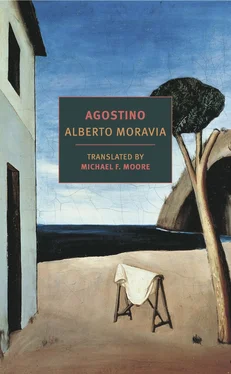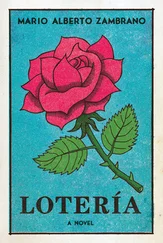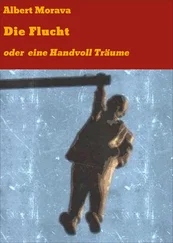When he came within sight of Vespucci, he slowed his pace. Although his heart was beating rapidly and he was almost out of breath, he assumed an attitude of indifference. Saro was sitting under the tarp as usual, at his wobbly table with a flask of wine, a glass, and a bowl with the remains of a fish stew. No one else seemed to be around. Or rather, as he approached the tarp, he discovered, dark against the whiteness of the sand, little Homs, the black boy.
Saro didn’t seem to be paying much attention to Homs. He was smoking a cigarette, lost in thought, a tattered old straw hat pulled over his eyes. “Where is everybody?” Agostino asked in a disappointed voice.
Saro looked up at him, regarded him for a moment, and said, “They all went to Rio.” Rio was a deserted location up the coast, a few kilometers away, where a stream flowed into the sea between the sand and a canebrake.
“Oh,” said Agostino, disappointed, “they went to Rio? What did they go there for?”
Homs replied, “They went to have lunch,” and made an expressive gesture, bringing his hand to his mouth. But Saro shook his head and said, “You kids won’t be happy till someone shoots you in the pants.” The lunch was clearly a pretext to go steal fruit from the fields, at least as far as Agostino could tell.
“I didn’t go,” the black boy replied in a fawning voice, as if to ingratiate himself with Saro.
“You didn’t go because they didn’t want you,” said Saro calmly.
The black boy protested, squirming in the sand. “No, I didn’t go because I wanted to stay with you, Saro.”
He had a smarmy, singsong voice. Saro said to him contemptuously, “Who gave you the right to call me by my first name, boy? We’re not brothers, you know.”
“No, we’re not brothers,” answered Homs, unperturbed. Indeed, he seemed jubilant, as if he were deeply pleased by the observation.
“So keep in your place,” Saro concluded. Then he turned to Agostino. “They went to steal fruit and corn. That’s their lunch.”
“Are they coming back?” Agostino asked impatiently.
Saro said nothing. He looked at Agostino and seemed to be mulling something over. “They won’t be back for a while,” he replied slowly, “not before evening. But if we want, we can join them.”
“How?”
“By boat,” said Saro.
“Yes, let’s take the boat,” cried the black boy. Eager to go, he got up and stood next to Saro, but the man ignored him completely. “I’ve got a sailboat. In half an hour, more or less, we can be in Rio, if the wind is good.”
“All right, let’s go,” said Agostino cheerfully. “But if they’re in the fields, how are we going to find them?”
“Don’t worry,” said Saro, standing up and adjusting the black sash around his waist, “we’ll find them.” He turned toward Homs, who was peering at him anxiously, and added, “And you, boy, help me carry the sail and the mast.”
“Right away, boss, right away,” the black boy said jubilantly, following Saro into the shack.
Left to himself, Agostino stood up and looked around. The mistral wind had picked up, and the rippled sea was now a purplish blue. In a dust cloud of sun and sand, the shoreline between the sea and the grove appeared deserted as far as the eye could see. Agostino didn’t know where Rio was, and with infatuated eyes he traced the capricious line of the solitary beach with all its points and bays. Where was Rio? Maybe over where the fury of the sun blurred sky, sea, and sand into a single widening haze? He was immensely attracted by the trip, and nothing in the world could make him miss it.
He was shaken from these reflections by the voices of the two coming out of the shack. Saro had a bundle of ropes and sails in one arm and a flask in the other. Behind him came the black boy, brandishing the green-and-white mast like a spear. “Off we go,” said Saro, heading down the beach without a glance at Agostino. He seemed to be in an unusual hurry, Agostino didn’t know why. He also noticed that his repellent flared nostrils seemed redder and more inflamed, as if the web of capillaries was suddenly swollen with thicker and brighter blood. “Off we go, off we go,” sang the black boy in Saro’s wake, the mast under his arm, improvising a kind of dance on the sand. Saro was ahead of him, almost to the cabins, so the black boy slowed down, waiting for Agostino to catch up. When he did, the black boy made a complicit gesture. Surprised, Agostino stopped.
“Listen up,” said the black boy in a familiar tone, “I need to talk with Saro about some things, so do me a favor— don’t come. Get lost.”
“Why?” asked Agostino, surprised.
“I just told you, because I need to talk to Saro, just the two of us,” the other boy said impatiently, stomping his foot.
“But I have to go to Rio,” Agostino replied.
“You can go another time.”
“No, I can’t.”
The black boy looked at him. In his blank eyes and oily, quivering nostrils, Agostino sensed an anxious passion that repelled him. “Listen here, Pisa,” he said, “if you don’t come, I’ll give you something you’ve never seen before.” He let the mast slip from his hands and dug into his pockets, pulling out a slingshot made from a pine twig and two rubber bands tied together. “Nice, huh?” the black boy said, showing it to him.
But Agostino wanted to go to Rio, and Homs’s insistence raised his suspicions. “No, I can’t,” he replied.
“Take the slingshot,” the other boy said, looking for his hand and trying to force the object into his palm. “Take the slingshot and get lost.”
“No,” Agostino repeated, “I can’t.”
“I’ll give you the slingshot and these playing cards,” the black boy said. He dug into his pockets again and pulled out a small deck of pink cards with gilt edges. “Take both of them and get lost. You can use the slingshot to kill birds. The cards are new—”
“I said no,” Agostino repeated.
The black boy looked at him, agitated and imploring. Large beads of sweat formed on his forehead, and his face suddenly twisted into a plaintive expression. “Why not?” he whined.
“I don’t want to,” said Agostino. And he fled toward the lifeguard, who by now had reached the boat on the beach. He heard the black boy yelling, “You’ll be sorry,” and, huffing and puffing, he reached Saro.
The boat was sitting on two raw pinewood logs, a short distance from the water. Saro had already tossed the sails into the boat and seemed impatient. “What’s he doing?” he asked Agostino, pointing to the black boy.
“He’ll be here in a second,” said Agostino.
At that moment the black boy came running, the mast under his arm, making long leaps over the sand. Saro grabbed hold of the mast with the six fingers of his right hand and then with the six fingers of his left. He stood it upright and stuck it in a hole in the middle seat. Then he got into the boat, attached the tip of the sail, and pulled on the line; the sail slid up to the top of the mast. Saro turned to the black boy and said, “Now let’s get to work.”
Saro stood to the side of the boat, gripping one side of the bow. The black boy got ready to push the stern. Not knowing what to do, Agostino looked on. The boat was of medium size, half white and half green. On the bow, in black letters, you could read its name, Amelia. “Heave-ho!” said Saro. The boat slid over the logs, advancing across the sand. As soon as the hull rolled off the rear log, the black boy would squat down, pick it up, press it against his chest like a baby, and leaping over the sand as if in a modern dance, run to place it under the bow. “Heave-ho!” Saro repeated.
Again the boat slid forward a stretch, and again the black boy raced from stern to bow, skipping and jumping with the log in his arms. With a final push, the boat slid with its stern lower into the water and floated. Saro got into the boat and started slipping the oars into the oarlocks. At the same time, he gestured to Agostino, with a complicity that excluded the black boy, to climb on board. Agostino waded into the water up to his knees and started to climb in. He wouldn’t have managed if the six fingers of Saro’s right hand hadn’t taken a firm hold of his arm and pulled him in like a cat. He looked up. While lifting him, Saro was concentrating not on him but on straightening out the left oar with his other hand. Filled with repulsion at the fingers that had gripped him, Agostino went to sit in the bow.
Читать дальше












